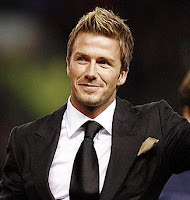Personality branding is a very nascent field, one which has developed very recently, with the explosion of mass media, and the evolving cultural climate of the world. 50 years ago, a sport star was merely a sports star, but today they have become larger than life personalities, endorsing products, causes, events, and much more. In fact, personality branding has become a vital tool for anyone to differentiate themselves in any given field, and stay ahead of the competition.
David Beckham is a case in point. As a footballer, he has his share of critics, who are more than ready to point out his poor heading, his under developed left foot play, his inferior one-on-one dribbling skills. However, there is no doubt that when it comes to football, Beckham is the sun among the stars, miles ahead of his contemporaries as a brand, even the more highly rated football players. When he shifted to Las Angeles Galaxy, he signed a whipping $250 million contract, while every other player burned with envy. What allows him to command such a premium? Personality Branding.
Brand Beckham is one of the biggest to come out of Great Britain, which was recognised by the Queen, when she bestowed the Order of the British Empire (OBE) on him in 2003. All through his career, whether it’s the highs or lows, he has never been out of the public eye. The power of branding really comes into play when we consider some of the speculation concerning his transfer to Real Madrid, which some commentators say may have been because of the brand synergies he could provide. He and Real Madrid were both sponsored by Pepsi and Adidas, whereas his old club, Manchester United, was sponsored by Adidas’ arch rival Nike. Tim Leiweke, the president and CEO of Anschultz Entertainment Group, which owns the LA Galaxy, said that within three months of signing on Beckham, there had been a rise in merchandise sales by 700% for the Galaxy and by 300% for the league. That is the power of personality branding.
Nor is this phenomenon limited to sports. Entertainment is one of the favourite echelons for celebrity brands. Take Oprah, for example. Having a talk show which has stayed at No.1 for 18 years is no mean feat. As a brand, Oprah has been very careful about steering clear of portraying herself as a business, instead taking on a I-am-every-woman role, one which everyone can relate to. Her willingness to open up is what helps her establish trust with her audience, and win their enduring loyalty. And the results speak for themselves. When she recommends something on her show, people go out and buy the product. Dick Parsons, CEO of Time Warner, says once Winfrey makes an endorsement sales increase tenfold.
An interesting point to differentiate between various brands would be on the basis of ownership – that is to say, how much does that celebrity own the brand. For example, we can clearly see that David Beckham plays a pivotal role in brand Beckham, and is the majority shareholder in his brand. One wont expect him to walk away from it. But can we say the same of celebrities who don’t have such feelings of loyalty or belonging to their brand, perhaps in one or the other girl or boy bands which seem to pop up every now and then. They may simply walk away from the brand, and few would be surprised, because their involvement in the whole product is quite low, in spite of being the face for the brand. Such celebrities may feel more like ‘employees’, something which would not go a long way towards inspiring loyalty from them.
~Anshuman Rastogi

No comments:
Post a Comment